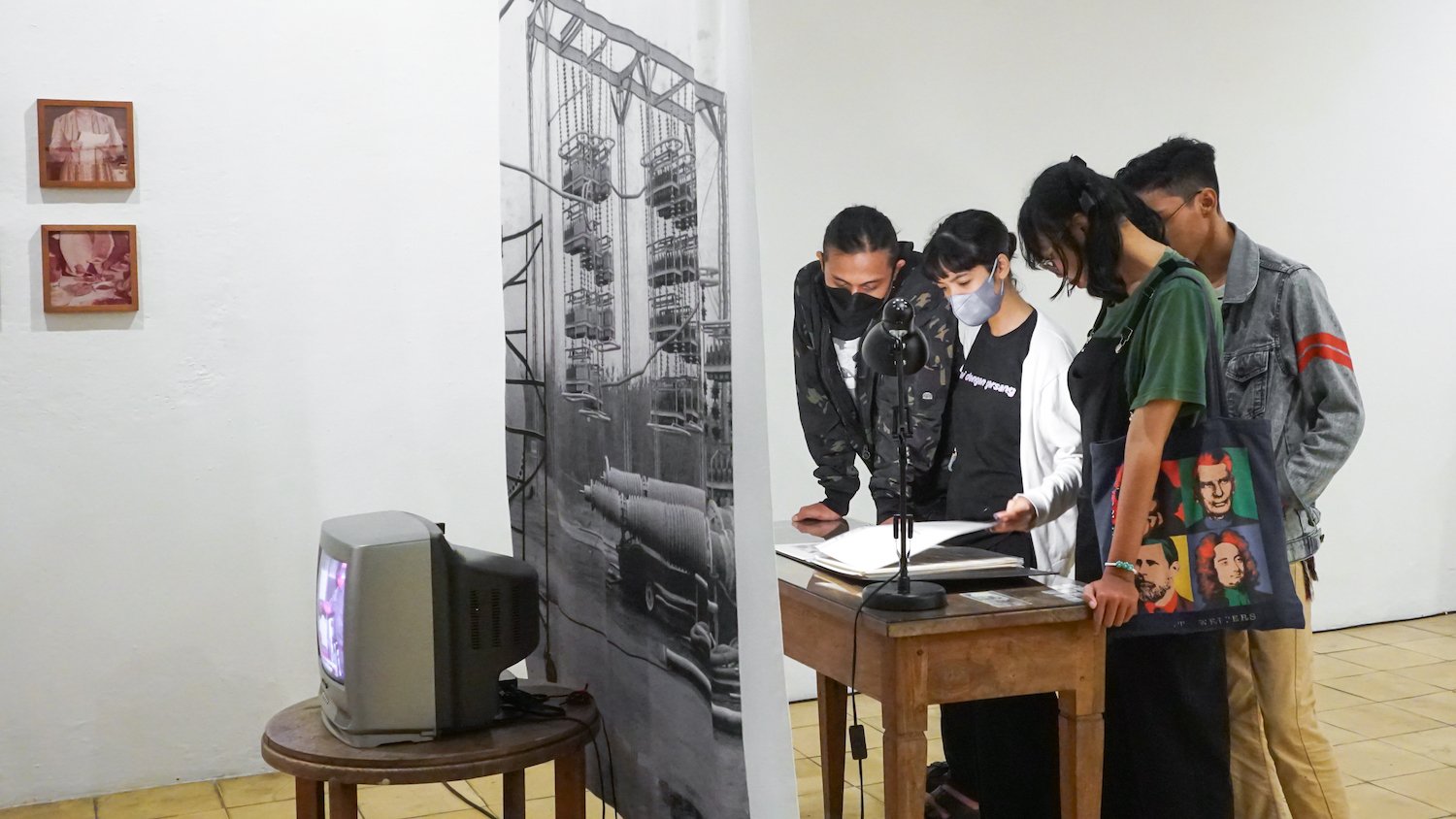My Own Words: Unhistoried; Archiving Vernacular Memories
Micro narratives from the New Order era
By Arif Furqan
'My Own Words' is a monthly series which features personal essays by practitioners in the Southeast Asian art community. They deliberate on their locality's present circumstances, articulating observations and challenges in their respective roles.
Growing up in the 1990s in Indonesia, I am part of what Marianne Hirsch describes as “the generation of postmemory“¹. It was a period of regime transition, from Soeharto's New Order, which lasted 32 years, to the Reformation which took place in May 1998. I did not experience oppression and dictatorship, but inherited second-hand trauma and terror from my parents and society at large.
I remembered an incident in which my brother drew a sketch of a hammer and sickle on the back of his book after watching a propaganda movie about the communist party. Knowing that, my father became furious and proceeded to tear up the book and burn it. Instead of simply removing the sketch with an eraser, he decided to act in such a way that trauma could not be passed on to us. Growing up, we were told obscure and controversial historical narratives which led to more questions than answers.
As such, I developed an enthusiasm for domestic stories. For me, home could become a magical space of sharing stories. Intimate family chats, small conversations, and even bedtime stories could challenge societal myths and propaganda in the media.
“For me, home could become a magical space of sharing stories. Intimate family chats, small conversations, and even bedtime stories could challenge societal myths and propaganda in the media.”
Since 2017, I have been working with vernacular archives of Indonesian families in a project called ‘Unhistoried‘. This undertaking is done individually and, at times, with my partner Reza Kutjh. ‘Unhistoried’ focuses on collecting, documenting, and researching the domestic archive. At the same time, I am also exploring possibilities for artistic work and publication.
Archive photo from ‘Unhistoried’. Image courtesy of Arif Furqan.
The majority of ‘Unhistoried’ collections are from the 1960s to the 1990s. As cultural anthropologist Karen Strassler has noted, photography has become more accessible to Indonesians due to the booming investment in and import of foreign products which started in the 1970s.² With the proliferation of handy 35mm cameras and their user-friendly automated system, it became common for families to take photos at home and record moments from daily life.
‘Unhistoried’ archives come from two main sources: found images we call orphan images, and the documents donated by participants. Unlike the historical photographs portraying monumental events, family photographs tell the tales of ordinary civilians as records of the domestic realm.
Our archiving project attempts to map the tendencies in family documentation. We classify several major themes. They are domestic rituals: birth, adolescence, marriage, death; portrayal of man as father, woman as mother, and child and inter-community relations, including work, sport, and travel. At the same time, by observing the common person’s attitude towards photography, we have noticed a diverse range of handiwork and craftsmanship in the family albums. Practices such as collage, sequence, and various modifications prove that family photography practice is not merely a passive mechanical process. Rather, it demonstrates active involvement, indicating a trace of interactions between people and the medium.
Arif Furqan, ‘Family to Nation', 2022, installation view at Jakarta International Photo Festival 2022. Image courtesy of the artist.
Arif Furqan, ‘Family to Nation', 2022, installation view. Photo by Syahidin Pamungkas. Image courtesy of Cemeti-Institute of Art and Society.
At the Jakarta International Photo Festival 2022, I presented an installation ‘Family to Nation’ made with materials from the ‘Unhistoried’ archives. Taking the form of a guest room, the work gave audiences access to various components of the archive such as photographs, documents, conversations, interviews, and even gossip. Collectively, these materials question the narrative of prosperity and development claimed by the New Order regime. With the aim to challenge such claims, the project juxtaposes the propagated discourse with domestic records. This provides an opportunity for today's generation to re-experience and interpret the political turbulence caused by the regime. ‘Family to Nation’ was presented for the second time at Cemeti Institute for Art and Society in 2023, in a group exhibition titled ‘Remembering 25 years of Reformation‘.
Audience watching the projection of ‘Proyeksi Zaman’, 2022, 8 minutes 12 seconds, a part of ‘Anatomi Jejak’ curatorial work by Unhistoried. Image courtesy of Padepokan Seni Bagong Kussudiardja.
We also experimented with institution archives in our commissioned work as curators for ‘Anatomi Jejak‘ (2023) held in Padepokan Seni Bagong Kussudiardja. The institution was one of a few that flourished during the New Order era. By modifying the mode of knowledge transfer from the archive to its readers, the exhibition allowed the public to participate and interpret the archive. It also explored how the myth of nationalism is utilised to personify the supposedly perfect, peaceful, and heroic regime.
Unhistoried, ‘Present Day Artefacts', 2022, scanned images printed on vinyl, various dimensions, installation view. Image courtesy of Yayasan Desa Akar Karsa - Tanijiwo.
Using archiving as a method, our work entitled ‘Present Day Artefact‘ (2023) responds to the impact of rapid development of technology and infrastructure within today's agricultural society. This project showcases an installation made from fertiliser packaging waste found around Mount Dieng, a well-known tourist destination and cultural and archeological site in Central Java. Ironically, due to the large quantity of packaging and its longevity, the waste can be seen as an artefact of civilsation like the temples of old.
Reflecting on our practices, archiving functions not only as a discipline. It can also open up possibilities for exploring the relationships among the medium, community, and history. ‘Unhistoried’ tries to create access to individual and collective narratives that enrich our knowledge of recent history. Through various approaches, we hope to position the common people not merely as passive subjects of history, but as active participants writing their own stories. This is an effort of decentring grand narratives by activating silent and other-ed archives. We believe that history is performative; and its richness lies in the inclusive participation of the ordinary.
“Reflecting on our practices, archiving functions not only as a discipline. It can also open up possibilities for exploring the relationships among the medium, community, and history. ”
Despite the fact that the New Order regime has fallen, there are still a lot of historical obscurities. Although some major policies have been officially discontinued, the awareness and attempt to revise the inherited system and indoctrination appear to be a faraway goal. Moreover, with the noise in digital culture, the younger generation seems to be drawn away from the issue. This is the reason why we conduct research in the in-between spaces and then further explore it artistically in ‘Unhistoried’. We believe that art has the ability to communicate effectively with the younger generation. After all, we realise that in the era of big data, management and preservation become vital tools against the forceful stream of forgetting.
The views and opinions expressed in this article are the author's own and do not necessarily reflect those of A&M.
This essay was first published in CHECK-IN 2023, A&M’s third annual publication. Click here to read the digital copy in full, or to purchase a copy of the limited print edition.
Read all My Own Words essays here.
1Marianne Hirsch, The Generation of Postmemory: Writing and Visual Culture After the Holocaust (New York: Columbia University Press, 2012).
2Karen Strassler, Refracted Visions: Popular Photography and National Modernity in Java, (Durham and London: Duke University Press, 2011).
About the Writer
Arif Furqan has been experimenting with photography and archives using various approaches exploring the issue of memory, home, family, and mobility. He was one of the Prince Claus Seed Award 2021 recipients for the project ‘Unhistoried’—an archive-based project focusing on Indonesian family photographs and archives from the New Order Regime.



















